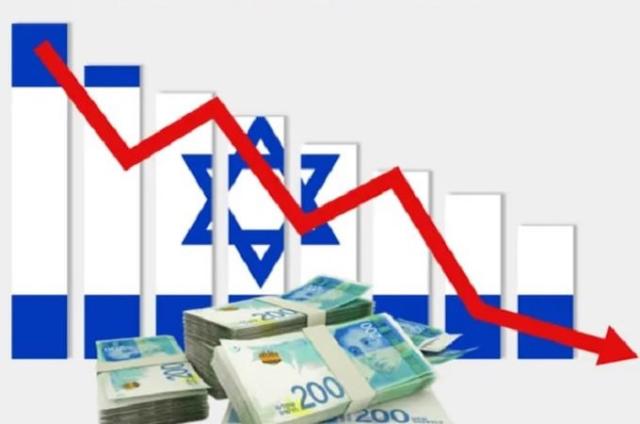In a stark reminder of the volatility gripping Israel's economy, the Central Bureau of Statistics has unveiled figures that signal a pronounced slowdown in economic growth during the second quarter of 2024. This deceleration comes on the heels of an extraordinary surge earlier in the year, illustrating the profound impact of ongoing geopolitical tensions and the lingering aftermath of conflict on the nation’s economic health.
A Tale of Two Quarters: From Surge to Slowdown
The numbers tell a dramatic story. After a jaw-dropping 17.3% rise in GDP during the first quarter of 2024—a figure that had ignited hopes of a robust economic rebound—Israel’s economy saw a sharp deceleration, with GDP growth plummeting to a meager 1.2% in the second quarter. This slowdown represents not just a cooling of the economy but a worrying sign of potential long-term challenges. The annualized data is even more sobering, showing a 1.4% contraction compared to the same period last year, underscoring the fragility of the current economic climate.
Private Consumption and Trade: A Grim Outlook
Private consumption, often the lifeblood of economic activity, also witnessed a steep decline. After an impressive 26.3% surge in the first quarter, spending growth slowed to 12% in the second quarter. This decline in consumer confidence reflects broader concerns about the future, as households tighten their belts in response to the ongoing conflict and economic uncertainty.
🚨Israel's Economic Performance in Q2 2024 Amidst Gaza Conflict
— PropagandaPatrol📝 (@lortaPropaganda) August 18, 2024
❌GDP Growth:
❎Israel's economy experienced a modest growth of 1.2% annualized in Q2 2024, falling short of the 2.3-5% that economists had forecasted.
❌Per Capita GDP:
❎There was a contraction in per capita… pic.twitter.com/Jq7bz0XheF
Trade, another critical component of Israel’s economy, painted an equally grim picture. Imports of goods and services, which had soared by an incredible 32.7% in the first quarter, fell by 11.1% in the second quarter. Meanwhile, exports of goods and services, excluding the vital diamond industry and high-tech startups, continued their downward trajectory, dropping by 7.1% after a 10.4% decrease in the previous quarter. This decline in both imports and exports indicates a broader slowdown in global trade dynamics, further exacerbated by the geopolitical situation.
Business Production and Investment: Faltering Amid Conflict
The decline in business production and investment is particularly concerning. Business production contracted by 1.9% in the second quarter, closely mirroring the 8.3% drop in exports. Investment in fixed assets, a key indicator of long-term economic health, eked out a mere 1.1% growth. These figures suggest that businesses are adopting a cautious stance, likely in response to the persistent uncertainty surrounding Israel’s security situation and the potential for further conflict.
The Impact of War: A Disrupted Economy
The economic turbulence is rooted in the broader context of the ongoing conflict. The year began with hopes of recovery following the severe 20.6% contraction in the last quarter of 2023, which was triggered by the devastating Hamas assault on southern Israel on October 7. This unprecedented attack left a deep scar on the nation, with over 1,200 civilians killed and 251 kidnapped, igniting a conflict that has since continued to shape Israel’s economic and social landscape.
The conflict’s impact on daily life has been profound. Hezbollah’s relentless rocket barrages from Lebanon have escalated fears of a full-scale war, disrupting life in northern Israel and forcing tens of thousands of residents to flee their homes. The resulting displacement has crippled local economies and disrupted workforce operations, further dampening economic activity.
Israel’s economic growth slowed more than expected over the second quarter of the year, failing to sustain its initial rebound from the war against Hamas https://t.co/huY8AcmMo4
— Bloomberg Economics (@economics) August 18, 2024
Credit Downgrades and Future Outlook: A Bleak Horizon
The latest economic data comes on the back of a series of credit rating downgrades. Fitch, the third global agency to lower Israel’s credit rating this year, downgraded the nation from A+ to A, citing the expectation that the conflict could drag on well into 2025. Fitch’s warning of “significant additional military spending, destruction of infrastructure, and more sustained damage to economic activity and investment” echoes similar concerns from S&P and Moody’s, which have also downgraded Israel’s credit rating.
The Bank of Israel, reflecting these concerns, has slashed its growth outlook for the coming years. The central bank now expects the economy to grow by just 1.5% in 2024, down from a previous forecast of 2%. Even the projection for 2025, at 4.2%, is tempered by the reality of ongoing conflict and economic instability.
The war has cost the Israeli economy $67.3 billion to date, not counting the billions of dollars in aid provided by Washington - JP pic.twitter.com/KUNH28gkiy
— S p r i n t e r (@SprinterFamily) August 19, 2024
Conclusion: Navigating the Storm
As Israel navigates these turbulent waters, the nation faces a daunting challenge: balancing the immediate demands of security and conflict with the need to stabilize and eventually rejuvenate its economy. The path forward is fraught with uncertainty, but Israel’s resilience and ability to adapt will be crucial in overcoming the economic and social upheaval wrought by this enduring conflict. The coming months and years will test the nation’s resolve as it strives to reclaim the robust growth that once seemed within reach.


